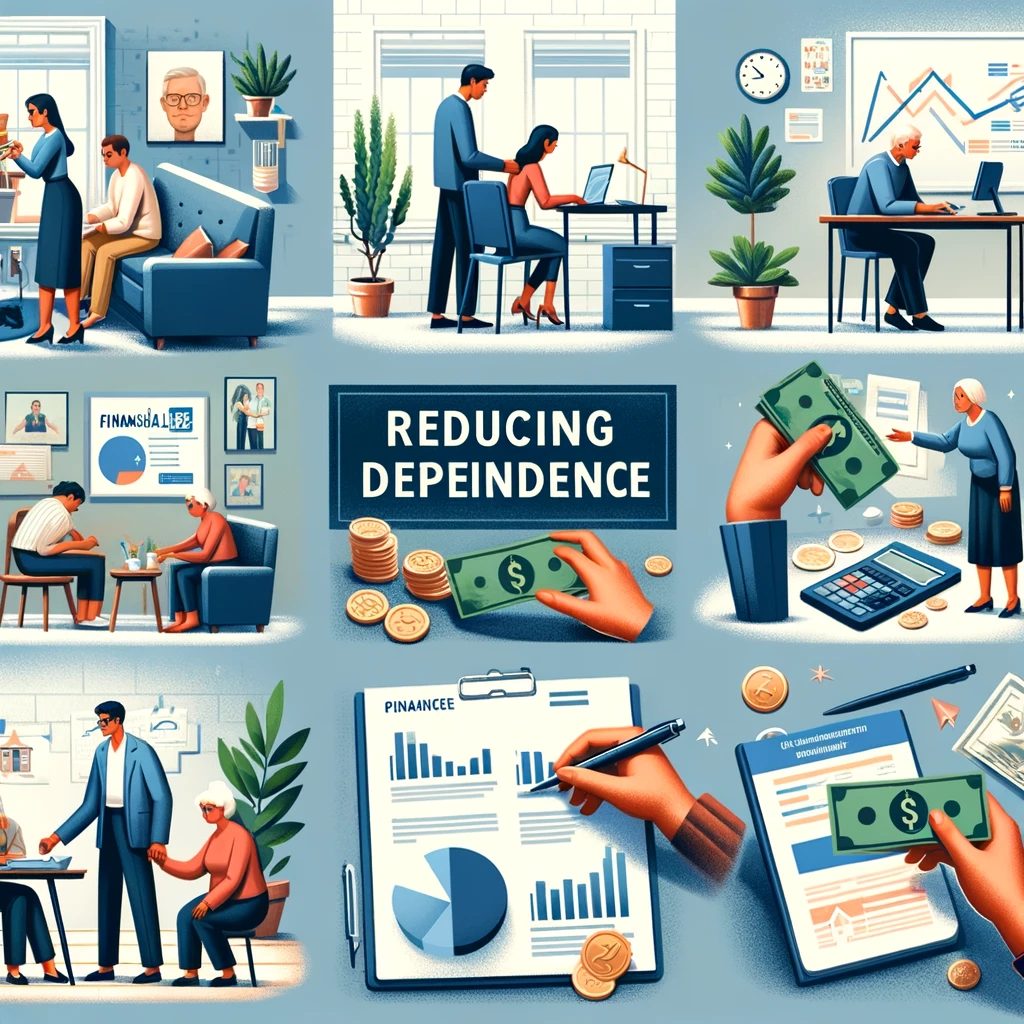The introduction of the article on financial independence for the elderly sets the stage for the topic at hand. It provides a brief overview of what readers can expect to learn throughout the article and highlights the importance of achieving financial independence in one’s later years.
The introduction aims to capture the attention of the readers and create interest in the subject matter. It may begin by emphasizing the significance of financial independence for the elderly, highlighting the challenges they may face in achieving it, and the potential benefits it can bring to their lives.
Furthermore, the introduction may touch upon the current economic landscape and how it affects the financial well-being of the elderly population. It may also mention the increasing life expectancy and the need for individuals to plan for their financial future to ensure a comfortable and secure retirement.
By providing a compelling introduction, the article aims to engage readers and make them eager to explore the various strategies, tips, and resources that will be discussed in the subsequent sections. It sets the tone for the rest of the article and establishes the importance of financial independence for the elderly as a key focus.
Understanding Financial Independence For The Elderly

Let’s delve into the concept of financial independence for the elderly and explore what it means for individuals in their retirement years. Financial independence refers to the ability of elderly individuals to support themselves financially without relying on others for financial assistance. It provides them with the freedom to make choices and live a comfortable and fulfilling life during their golden years.
To achieve financial independence, it is crucial for the elderly to have a clear understanding of their financial situation. This includes assessing their income, expenses, assets, and liabilities. By having a comprehensive overview of their financial standing, they can make informed decisions and take necessary steps to secure their financial future.
Retirement planning plays a vital role in achieving financial independence for the elderly. It involves setting goals, estimating future expenses, and determining the amount of savings required to meet those expenses. Retirement planning also involves considering factors such as healthcare costs, inflation, and potential sources of income, such as pensions or social security benefits.
Furthermore, investment options are essential for the elderly to grow their wealth and generate income. This section will explore various investment options suitable for the elderly, such as stocks, bonds, real estate, and annuities. It will provide insights into the risks and rewards associated with each investment option, helping elderly individuals make informed investment decisions.
Overall, understanding financial independence for the elderly is crucial for their well-being and security in retirement. This section will provide valuable information and insights to help elderly individuals navigate their financial journey and achieve a secure and independent future.
Retirement Planning for the Elderly

Retirement planning is a crucial aspect of achieving financial independence for the elderly.
One of the first steps in retirement planning is determining the desired retirement age and lifestyle. It is important for elderly individuals to assess their financial goals and needs during retirement, taking into consideration factors such as healthcare expenses, living costs, and potential long-term care needs.
Next, it is essential to evaluate existing retirement savings and investments. This includes assessing the performance of retirement accounts, such as 401(k)s or IRAs, and making necessary adjustments to ensure they align with retirement goals. Additionally, exploring other investment options, such as annuities or real estate, can provide additional income streams during retirement.
Another important aspect of retirement planning is understanding and maximizing Social Security benefits. Elderly individuals should familiarize themselves with the eligibility requirements, claiming strategies, and potential impacts of early or delayed claiming. This can significantly impact the amount of monthly income received during retirement.
Furthermore, it is crucial to create a comprehensive retirement budget. This involves estimating future expenses and income sources, including pensions, investments, and Social Security. By carefully managing expenses and ensuring a steady income stream, elderly individuals can maintain financial stability throughout their retirement years.
Overall, effective retirement planning is essential for achieving financial independence for the elderly. By carefully considering retirement goals, evaluating investments, maximizing Social Security benefits, and creating a comprehensive budget, elderly individuals can secure a financially stable future.
Passive Income Sources for the Elderly

Next, we will explore various passive income sources that can help elderly individuals achieve financial independence. Passive income refers to money earned with little to no effort on the part of the recipient. It is a great way for the elderly to supplement their retirement income and reduce their reliance on others.
One passive income source for the elderly is rental properties. Owning and renting out properties can provide a steady stream of income, especially if the properties are located in high-demand areas. This can be a lucrative option for those who have the means to invest in real estate.
Another passive income source is dividend-paying stocks. Investing in stocks that pay regular dividends can provide a consistent income stream for the elderly. It is important to research and choose stocks from reputable companies with a history of stable dividends.
Additionally, annuities can be a reliable source of passive income for the elderly. An annuity is a financial product that provides regular payments over a specified period of time. It can be purchased from insurance companies and can provide a guaranteed income stream.
Lastly, creating and selling digital products or online courses can be a passive income source for tech-savvy elderly individuals. With the rise of the internet, there are numerous platforms available for selling digital products and courses, allowing the elderly to share their knowledge and expertise while earning income.
By exploring these passive income sources, elderly individuals can diversify their income streams and work towards achieving financial independence. It is important to carefully consider each option and seek professional advice if needed to ensure the best possible outcomes.
Reducing Financial Dependence On Others

In this section, we will explore various strategies and techniques that can help elderly individuals reduce their financial dependence on others. This is an important aspect of achieving financial independence, as it allows them to have control over their own finances and maintain a sense of autonomy.
One way to reduce financial dependence is by focusing on increasing income sources. This can be done through part-time work or starting a small business that aligns with their skills and interests. By generating additional income, elderly individuals can supplement their retirement savings and reduce their reliance on others for financial support.
Another strategy is to minimize expenses and live within one’s means. This involves creating a budget and tracking expenses to identify areas where spending can be reduced. By cutting unnecessary expenses and prioritizing essential needs, elderly individuals can stretch their income further and reduce the need for financial assistance.
Additionally, exploring alternative housing options can also help reduce financial dependence. Downsizing to a smaller home or considering shared living arrangements can significantly lower housing costs and free up funds for other expenses.
Lastly, it is crucial for elderly individuals to stay informed about government programs and benefits that they may be eligible for. This includes social security, Medicare, and other assistance programs that can provide financial support and alleviate the burden of expenses.
By implementing these strategies and techniques, elderly individuals can take steps toward reducing their financial dependence on others and achieving greater financial independence. This not only provides them with a sense of security and control over their finances but also allows them to enjoy their retirement years with peace of mind.
Government Programs And Benefits For The Elderly

Next, we will explore the various government programs and benefits available to support the financial independence of the elderly. As individuals age, they may face unique financial challenges, and it is important for them to be aware of the resources and assistance that are available to them.
One of the most well-known government programs for the elderly is Social Security. This program provides a monthly income to eligible individuals who have paid into the system throughout their working years. Understanding how Social Security works, when to start receiving benefits, and how to maximize those benefits can greatly impact an elderly individual’s financial independence.
In addition to Social Security, there are other government programs and benefits that can provide financial support to the elderly. These may include Medicare, which provides healthcare coverage for individuals aged 65 and older, as well as Medicaid, which provides healthcare coverage for low-income individuals.
There are also programs such as the Supplemental Security Income (SSI) program, which provides financial assistance to elderly individuals with limited income and resources. Additionally, there may be state-specific programs and benefits that can provide further support.
By exploring and understanding these government programs and benefits, elderly individuals can make informed decisions about their financial future and take advantage of the resources available to them. This knowledge can help them achieve greater financial independence and security in their later years.
Resources To Support The Financial Independence Of The Elderly

Next, we will explore the various resources available to support the financial independence of the elderly. As individuals age, it becomes increasingly important to have access to resources that can provide assistance and guidance in managing their finances.
One of the key resources for the elderly is financial counseling services. These services can provide personalized advice and guidance on retirement planning, investment options, and budgeting techniques. They can help individuals create a financial plan tailored to their specific needs and goals, ensuring that they are on track to achieve financial independence.
Another valuable resource is community organizations and non-profit groups that offer financial assistance programs for the elderly. These programs may provide grants, scholarships, or low-interest loans to help cover expenses such as healthcare, housing, or daily living costs. They can be a lifeline for those who are struggling financially and need additional support.
Government programs and benefits also play a crucial role in supporting the financial independence of the elderly. Social Security, Medicare, and Medicaid are just a few examples of programs that provide financial assistance and healthcare coverage for seniors. Understanding and accessing these programs can significantly impact an elderly individual’s financial well-being.
Lastly, online resources and educational materials can be invaluable in helping the elderly gain knowledge and skills to achieve financial independence. Websites, blogs, and forums dedicated to personal finance for seniors can provide valuable information on topics such as investment strategies, passive income sources, and budgeting techniques.
Here are affew:
Resources for the elderly to obtain financial independence can vary based on location and individual circumstances, but here are some general resources that are often available:
- Government Pensions and Social Security: In many countries, government-provided pensions or social security benefits are a primary source of income for the elderly. It’s important to understand how to apply for these benefits and how they work.
- Senior Employment Programs: Some organizations and government agencies offer employment programs specifically designed for seniors, providing opportunities for part-time or flexible work.
- Financial Counseling Services: Non-profit organizations and government agencies often offer free or low-cost financial counseling for seniors. These services can help with budgeting, debt management, and financial planning.
- Reverse Mortgages: For homeowners, a reverse mortgage allows them to convert part of the equity in their home into cash. This can be a useful tool for seniors needing additional income, but it’s important to understand the terms and implications.
- Investment Advice: Professional financial advisors can provide guidance on how to manage savings and investments to ensure a steady income during retirement.
- Tax Assistance Programs: There are often programs available to help seniors with tax preparation and to understand potential tax benefits for which they may be eligible.
- Discounts and Assistance Programs: Many businesses offer discounts to seniors, and there are various assistance programs for things like utility bills, healthcare, and food.
- Community and Senior Centers: These centers often provide resources and information about services available to seniors, including financial advice and assistance programs.
- Health Insurance Counseling: Understanding health insurance options, including Medicare and supplemental insurance, is crucial for managing healthcare costs in retirement.
- Legal Aid Services: Some organizations provide free or low-cost legal services to seniors, which can be important for estate planning and understanding financial rights and options.
Conclusion For “Financial Independence For The Elderly.
“Financial Independence for the Elderly.” In this section, we will summarize the key points discussed throughout the article and provide a final thought or recommendation.
The conclusion will serve as a wrap-up of the information presented in the previous sections, highlighting the importance of financial independence for the elderly and the various strategies and resources available to achieve it. It will emphasize the significance of retirement planning, investment options, passive income sources, budgeting techniques, and reducing financial dependence on others.
The writer may also mention the government programs and benefits that can support the financial independence of the elderly, emphasizing the importance of taking advantage of these resources. The conclusion will aim to leave the readers with a sense of empowerment and motivation to take control of their financial future.
Additionally, the writer may include a call to action, encouraging readers to implement the strategies and tips discussed in the article. They may also provide additional resources or references for further information on the topic.






